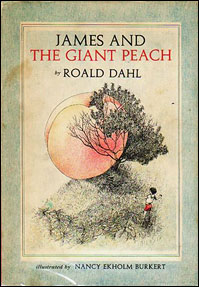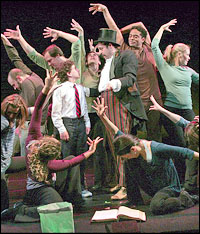
The writers who share music and lyric chores returned to a page from their childhood this fall with the world premiere of the musical James and the Giant Peach, now playing to Nov. 21 at Goodspeed Musicals' Norma Terris Theatre. We asked Pasek & Paul (whose A Christmas Story musical is dawning shortly in Seattle) about their connection to the Dahl classic about an orphan who climbs inside a magic peach and meets creatures within. Read Playbill.com's earlier story about the new musical, which features a book by Timothy Allen McDonald, direction by Graciela Daniele and choreography by the modern dance troupe Pilobolus.
Did you read "James and the Giant Peach" as a kid, or was it new to you when you were asked to work on the musical version?
Justin Paul: I did, in fact, read "James" as a kid. I don't know for how long this has been the case, but when I was growing up Dahl was pretty standard in the elementary/middle school literary list. But it was always one of those books that your teacher assigned you that you secretly actually liked. It wasn't necessarily cool or proper to "enjoy" your homework, so you couldn't show it. But all of Dahl's works were so vivid and full of fantasy, kind of dark and even a little bit crude. I would read it with a smile on my face, as my 11-year-old mind would think, "I can't believe my teacher assigned this to me!" So when we were approached to pitch for the show, I was quite familiar with the book and the story.
Benj Pasek: I grew up reading many of Roald Dahl's books. As a young boy, I was constantly on the lookout for purpled-eyed undercover witches at our local supermarket, and wondered what fantastic mammals might be burrowing in my backyard. I particularly took to "James and the Giant Peach," having a keen fascination with James' evil aunts, Spiker and Sponge. They petrified me, and simultaneously made me laugh. I think kids enjoy being frightened, and these two vile women scared me and stuck in my head for many years after reading the book.
| |
 |
|
In addition to this "want," Dahl has created this fantastical, magical world where anything can happen. The characters are larger than life, magic is real, giant insects speak with proper British accents...it's a world that leaps off the page when you read the book, and so naturally the story wants to sing, it wants to dance, it wants to be unconventional and innovative and exciting and a little bizarre. And I think that's what we're going for in this production...
Benj Pasek: I think fantasy worlds tend to make for great source material for musicals. In real life, we don't randomly break into song when we want to express a thought, but in a story filled with jumbo fruit, talking insects and so many other larger-than-life characters, it seems natural to tell the story through music. "James and the Giant Peach" is also a very emotional story centering on an orphaned boy who wants to find a family. That kind of big emotion is great to inspire song moments!
What in the story struck you as an adult that didn't strike you when you were a child?
Justin Paul: The darkness of the story. I think as a kid, just like James, you have this resilience to bad things happening to you, to torture, to life's injustice and unfairness. Kids bounce back and forge on. So I think reading the book as a kid I just accepted that James' parents died, that he had to live with these horrible aunts, but because he always made the best of it and stayed hopeful, so did I. I was right there with him. But as an adult (am I an adult yet?!), it's quite striking how dark this tale is, or at least starts out. James watches his parents attacked and killed by a giant white rhino; he is not taken care of by any sort of foster system; he is sent to live with two absolutely wretched women (his aunts). As an adult, it really makes you gulp. Now as I said, we track James through all of this, and he is resilient. So it's not ultimately depressing. But when you stop to think about it, it's pretty dark stuff.
| |
 |
|
| A scene from James and the Giant Peach | ||
| photo by Diane Sobolewski |
Benj Pasek: We have relished in being able to implement darker undertones in much of the story. In one musical moment, James is shuffled from a boy's orphanage to a sweatshop to an insane asylum. In another moment, a string of pearls is used like a dog leash to yank James around the stage. We've been particularly surprised at how young audiences have responded to the scarier elements in the show. During a nightmare sequence, just when we expected the very young kids to start screaming or crying, we've watched them lean in with wide-eyed fascination and wonder. Dahl must have known this when he wrote his stories. Kids like to be scared, and in this developmental production of our show, we're embracing those darker elements.
Justin Paul: Come watch the first two numbers of our show and I think it will be quite clear that we are embracing the darkness! As a creative team, we decided from the beginning that we were not writing a show for children. We certainly want to be able to play to a family audience, so we've kept that in mind, but we are taking some of Dahl's darkness and expanding it even more. We have Pilobolus and [an] extraordinary director who is so adept at using the human body in a mysterious and somewhat dark way. So we had to embrace that darkness. The second song in the show follows James as he's sent from a British court to a transient boys' home, then to a meat factory (which is really just a sweatshop) and eventually he lands at an insane asylum. The number is sort of a commentary on a failed foster system (a bit exaggerated, of course) but feels totally in line with what Dahl wrote, and how his mind worked. We've tried to balance the dark with real moments of "light," so I think we'll keep our audience.
Can you explain the musical colors of the show? Pop? "Traditional" show music? Eclectic?
Justin Paul: Definitely eclectic. I think to write in any one style for the entire show would be antithetical to the wide palette Dahl used to write his novels. There are so many colors, from vivid neons to dull grays, and everything in between. While I don't know if our score goes that far, we're definitely exploring lots of different styles. I think it all lives within the "show music" world, but in there you've got everything from high British marches to sexy Latin salsa to contemporary pop/gospel. We kind of decided to try and write without boundaries and just allow the story to take us to whatever musical style it wanted to take us to. I think it all lives within the same world...so you're not going to be hearing songs that feel disjointed or disconnected. But within that world we've really allowed ourselves to play.
Benj Pasek: We've tried to make the show musically eclectic, while retaining a consistent voice. While the opening number is a heightened version of an old-fashioned traditional musical theatre song, the score ranges from jazz to pop to gospel to Burt Bacharach in style. Our biggest cue for tonality really comes from the character we're writing for and the moment in the show we're supporting.
Is James and the Giant Peach a genuine book musical, with songs that come out of spoken dialogue, or is it sung-through?
Justin Paul: This is a gen-u-wine, good ol' fashioned book musical, folks! Well, let's not say "old fashioned," because it's actually quite contemporary in feel and tone. But I think this show actually harkens back to an older era of musicals because of the way the story is being told: [it features] songs that are truly integral to the plot, that advance our story. But more than that, what's probably more impressive, is how much of the story is being told through dance and the use of the human body. Director Graciela [Daniele's] work on this show, and Pilobolus' work on this show, is just magnificent. They have created a couple of "ballets" that really do conjure memories of Oklahoma!, West Side Story, etc., because the story is being told, and plot is being advanced, through these dances. It's really remarkable...I don't think I've seen anything like it in quite a while.
For more information about the work of Pasek and Paul, visit www.pasekandpaul.com or www.bwayboys.com.











